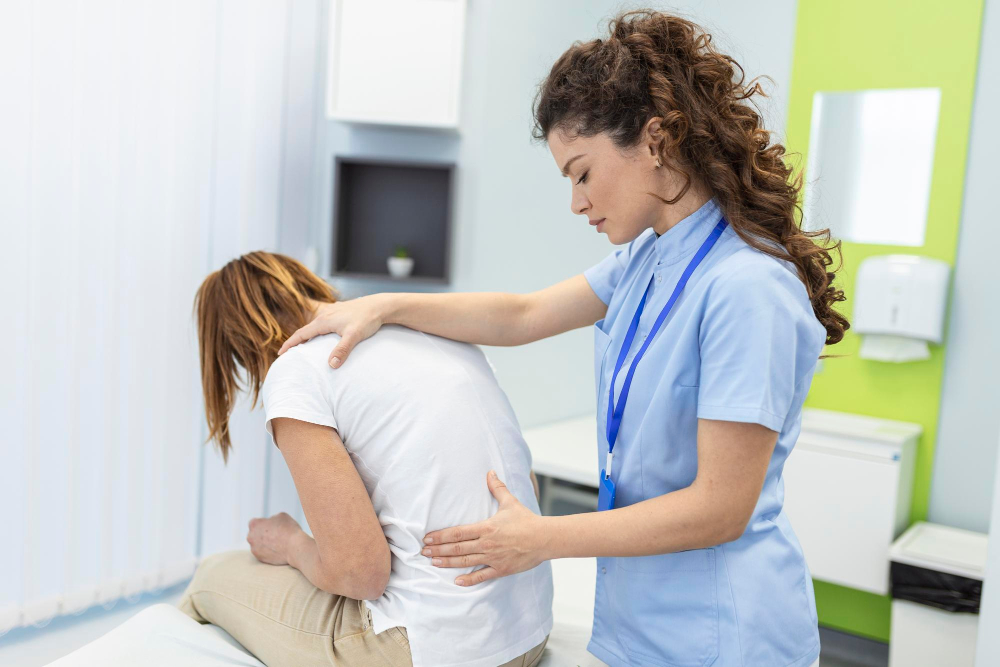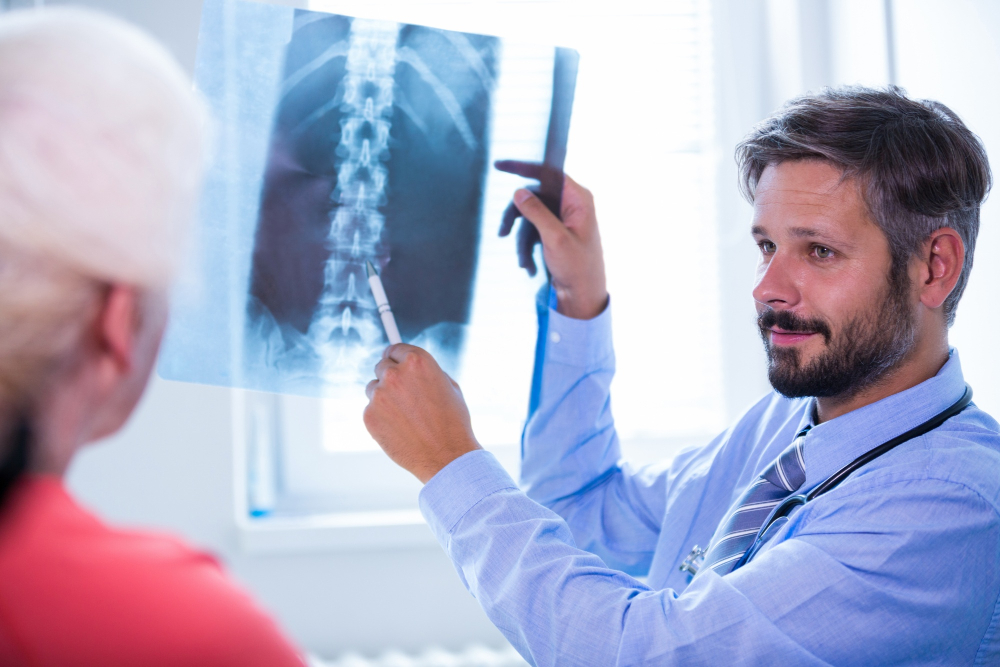Best Treatment for Spinal Cord Injury
Category: Spine
Spinal cord injury (SCI) is a serious medical condition that occurs when the spinal cord is damaged, disrupting communication between the brain and the body. Injuries can result from trauma, accidents, falls, or underlying medical conditions. Common spinal cord injury symptoms include loss of sensation, weakness or paralysis in limbs, and impaired bladder or bowel control. Early recognition and treatment are crucial to minimize permanent damage and improve outcomes.
At Lokmanya Hospitals, patients receive comprehensive care for spinal cord injury treatment in Pune, from initial assessment to advanced interventions. With specialized facilities and a multidisciplinary team, Lokmanya ensures precise diagnosis, timely surgical intervention, and structured spinal cord injury rehabilitation, making it one of the leading centers for managing traumatic spinal cord injuries.
Causes of Spinal Cord Injury
Spinal cord injuries can result from a variety of factors, ranging from sudden trauma to underlying medical conditions. Understanding these causes is essential for prevention, timely treatment, and better recovery outcomes.
1. Traumatic Injuries
Trauma from car accidents, falls from height, sports injuries, or violent incidents is the leading cause of spinal cord injury. These sudden impacts can fracture or dislocate vertebrae, compress nerves, and result in immediate symptoms such as paralysis, numbness, or severe pain. Prompt medical attention is critical to prevent permanent damage.
2. Medical Conditions
Certain health conditions can weaken the spine and make it prone to injury. Infections like osteomyelitis, spinal tumors, or degenerative diseases such as spondylosis can compromise spinal stability, increasing the risk of spinal cord damage even from minor trauma.
3. Complications from Surgery or Procedures
Although rare, spinal surgeries or invasive medical procedures can sometimes cause accidental damage to the spinal cord. This underscores the importance of consulting experienced surgeons and specialized hospitals for spine care.
4. Congenital Disorders
Some individuals are born with spinal abnormalities such as spina bifida or scoliosis, which may make the spinal cord more vulnerable to injury later in life. Early monitoring and preventive care are essential to reduce risks.
5. Osteoporosis and Bone Weakening
Conditions like lumbar spine osteoporosis can weaken vertebrae, making fractures more likely even from minor falls or everyday activities. Weakened bones can compress or damage the spinal cord, leading to serious complications.
6. Sports and High-Risk Activities
Engaging in high-impact sports like football, gymnastics, or diving increases the risk of sudden trauma to the spine. Proper training, protective gear, and safety measures are crucial to prevent spinal cord injuries.
7. Age-Related Degeneration
Aging naturally weakens bones, discs, and spinal ligaments, making older adults more prone to spinal cord injuries from minor accidents or falls.
Symptoms of Spinal Cord Injury
Spinal cord injuries can present with a wide range of symptoms depending on the severity and location of the injury. Recognizing these signs early is crucial for timely treatment and minimizing long-term complications.
1. Loss of Sensation
Numbness, tingling, or reduced sensitivity in the arms, legs, or trunk often indicates nerve damage. Patients may also experience an inability to feel temperature changes or pain below the level of injury, signaling disruption in spinal nerve communication.
2. Paralysis or Weakness
Depending on the location and severity of the injury, partial or complete paralysis can occur. Injuries to the cervical spine may affect all four limbs (quadriplegia), while lower injuries may impact only the legs (paraplegia). Weakness may also present as difficulty walking, standing, or performing everyday tasks.
3. Pain or Pressure
Severe back, neck, or limb pain can result from vertebral fractures, nerve compression, or inflammation. This often worsens with movement and may be accompanied by a feeling of pressure in the spinal region.
4. Bladder and Bowel Dysfunction
Disruption of nerve pathways can lead to urinary retention, incontinence, or constipation. This symptom often appears soon after injury and requires prompt medical evaluation to prevent complications.
5. Muscle Spasms and Spasticity
Abnormal muscle stiffness or involuntary spasms are common after SCI. These can range from mild twitches to severe, painful contractions, affecting mobility and daily activities.
6. Difficulty Breathing
Injuries to the upper spinal cord, especially in the cervical region, may affect the diaphragm and chest muscles, leading to shortness of breath or difficulty breathing. Immediate intervention is critical in such cases.
7. Changes in Blood Pressure and Heart Rate
SCI can impact the autonomic nervous system, leading to irregular heartbeats, low or high blood pressure, and issues with blood circulation.
8. Sexual Dysfunction
Nerve disruption may lead to reduced sexual sensation or function, affecting both men and women. Early rehabilitation and counseling can help manage these changes.
9. Emotional and Cognitive Changes
Chronic pain, mobility limitations, and life adjustments after SCI can lead to depression, anxiety, or sleep disturbances. Comprehensive care should include psychological support.
Treatment Options for Spinal Cord Injury
Effective treatment for spinal cord injury depends on the type, severity, and location of the damage. Early intervention and a comprehensive care plan can significantly improve recovery and quality of life.
- Emergency Care and Stabilization
Immediate immobilization and careful handling prevent further damage. Emergency care may include corticosteroids to reduce inflammation and swelling.
- Spinal Cord Injury Surgery
Surgical intervention may be required to remove bone fragments, stabilize the spine, or decompress nerves. Advanced spinal cord injury surgery improves the chance of recovery and reduces long-term disability.
- Medication Management
Pain relief, muscle relaxants, and anti-inflammatory medications are used to manage symptoms and prevent complications.
- Rehabilitation Therapy
Structured spinal cord injury rehabilitation is essential for regaining mobility, improving strength, and restoring independence. It includes physiotherapy, occupational therapy, and specialized exercises.
- Assistive Devices
Wheelchairs, braces, and other mobility aids help patients adapt to limitations and maintain quality of life.
Why Choose Lokmanya Hospitals for Spinal Cord Injury Treatment?
Lokmanya Hospitals is recognized as a premier center for treatment for spinal cord injury in Pune. The hospital combines advanced diagnostics, expert surgeons, and cutting-edge technology to provide precise and timely interventions. From initial assessment to complex spinal surgeries, Lokmanya ensures patients receive the best possible care at every stage.
With a multidisciplinary approach, Lokmanya offers comprehensive spinal cord injury rehabilitation, including physiotherapy, occupational therapy, and lifestyle guidance. The hospital’s patient-centered model focuses on long-term recovery, functional independence, and minimizing the risk of spinal cord injury complications, making it a trusted choice for families seeking specialized spinal care.
Conclusion
Spinal cord injuries can have life-altering consequences if not treated promptly and effectively. Early intervention, expert surgical care, and structured rehabilitation are crucial to improving outcomes and enhancing quality of life.
At Lokmanya Hospitals, patients benefit from state-of-the-art facilities, highly skilled specialists, and personalized spinal cord injury treatment plans. From emergency stabilization and advanced spinal cord injury surgery to comprehensive rehabilitation, Lokmanya is committed to helping patients regain mobility, independence, and confidence in their recovery.
FAQs
1. What are the most common causes of spinal cord injury?
Trauma from accidents, falls, sports injuries, or underlying medical conditions can cause spinal cord injuries.
2. What symptoms indicate a spinal cord injury?
Numbness, weakness or paralysis, severe back or neck pain, and bladder or bowel dysfunction are common spinal cord injury symptoms.
3. Can spinal cord injuries be fully treated?
While full recovery depends on the severity, early surgical intervention, medication, and rehabilitation can significantly improve function and quality of life.
4. What does rehabilitation for spinal cord injury involve?
It includes physiotherapy, occupational therapy, exercises for strength and mobility, and use of assistive devices to restore independence.
5. Why choose Lokmanya Hospitals for spinal cord injury treatment in Pune?
Lokmanya Hospitals is the best spine hospital in Pune, offering expert surgical care, advanced diagnostics, and comprehensive rehabilitation for traumatic spinal cord injury.
Previous blog







